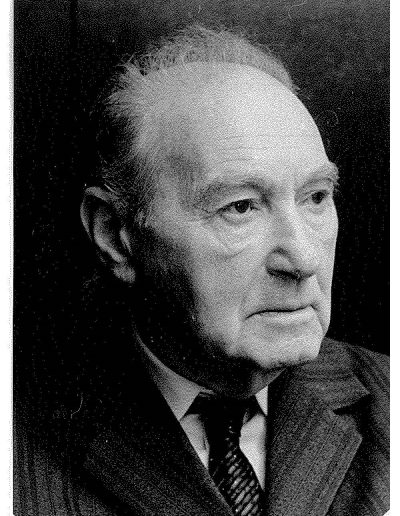Ádám Anavi
February 26, 1909, Turda - February 23, 2009, TimișoaraPoet, writer, playwright, translator, teacher
Francisc (Ferenc) Frucht was born in Turda. His father, Izidor Frucht, was a traveling watchmaker (from Vienna to Bratislava, then to Maramureş, Szeged, Szabadka, Bosnia), who settled in Turda in 1899 and opened a watchmaking workshop. Francisc attended high school in his hometown, then graduated from the Faculty of Psychology and Philosophy, University of Cluj. In his youth he was attracted to communist and Zionist ideas.
From 1937 until his retirement he worked as a teacher in educational institutions in Timisoara. During 1941-1944, as a result of racial measures, being expelled from Piarist High School, he taught at the Israelite High School, where he continued to be a teacher until the dissolution of the high school in 1948.
Since 1928 he has published in Hungarian periodicals in Romania, „Utunk", „Igaz Szó", „A Hét", „Délvilág", „Irodalom", „Müvelödés", „Helikon", „Korunk", „Élet és irodalom", „Látó", „Jó Pajtás", „Új Kelet", „Bánsági Üzenet", „Szabad Szó", „Hetí Új Szó", „Orizont". In the years 1944-1954 he was one of the representatives of the communist political lyric, later he turned to philosophical and playful-humorous lyric.
He became known by the pseudonym Anavi Ádám, which he adopted for several reasons: it was an easy-to-pronounce name for Hungarian speakers; the name Anavi comes from two sources: ha-navi, Hebrew, "the prophet", but also anav, Hebrew, "grape", and the name of the poet's mother before marriage was Traub, which means "grape" in German. Adam in Hebrew means man, dam - blood, adam - the man made of red earth.
He was in charge of the Ady Endre Literary Cenacle, then president and honorary president of the Franyó Zoltán Literary Cenacle.
The fine humor in his epigrams and verses is still very successful today, as are the two poems in memory of the victims of the Holocaust Rekviem két hangra (Requiem for two voices) and Megszámoltak és megszámoztak (Count and number).
His comedy II Matyi (Matyi II), directed by the actor Péter Dukász, premiered at the Hungarian Theater in Timişoara, on February 26, 2009, when he was preparing to celebrate his 100th birthday. The poet died 3 days before.
Publications
- Öregek igazsága/ The truth of the elders, thater, Timişoara, 1940
- Hess szegénység/ Boo, poverty, verses, Timişoara, 1944
- Indulnak hadirendben/ I start at dawn, poems, Bucharest, ESPLA, 1953
- Etika és kibernetika/ Ethics and cybernetics, poems, Bucharest, Kriterion Publishing House, 1970
- Metaforás idők/ Metaphor time, poems, Timişoara, Facla Publishing House, 1974
- Csülök és a többi négy/ Csülök and the other four, Timişoara, Facla Publishing House, 1977
- Children's plays, Bucharest, Ion Creangă Publishing House, 1984
- Szembesités többedmagammal/ Confrontation in plural, poems, Bucharest, Kriterion Publishing House, 1988
- A sanda mészáros szemével avagy Napoleon poloskája/ With the eyes of the blind butcher or Napoleon's bedbug, satirical poems, Timişoara, Viana Publishing House, 1995
- Kepler, drama in 7 paintings, Timişoara, Hestia Publishing House, 1995
- Az esztenák asszonya/ Shepherd woman, dramatic legend, Timişoara, Excelsior Publishing House, 2000
- Válagotott versek/ Selected poems, Concord Media Publishing House, 2004
- Lyrics, translation Ildikó Gabos and Şerban Foarţă, Timişoara, Western University Publishing House, 2002
The plays staged
Kepler şi Andromeda, Az eltünt szeretö/ The missing boyfriend; Kecskelovag/ The knight on the goat, music by Aladár Zoltán, Timişoara, 1971; Fénypásztorok (Shepherds of light) in 1980. Comedy II Matyi (Matyi II), 2009, Hungarian Theater Timişoara.
Books written in collaboration
Pellengér/ The pillar of infamy, satirical poems written in collaboration with Bajor Andor and Bodor Pál, Bucharest, ESPLA, 1955. Translations from Romanian into Hungarian. Lyrics by: Mihai Eminescu, Tudor Arghezi, Lucian Blaga, Eugen Jebeleanu, Mircea Dinescu, Anghel Dumbrăveanu, Alexandru Jebelean, Eugen Bunaru, Aurel Turcuş, as well as prose by Sorin Titel and Laurenţiu Cerneţ. Translated from Hungarian into Romanian: Anthology of Hungarian poets from R.P.R., 1970; Timișoara lyrics, 1970; The moment of love, 1971; The effigies of the homeland, 1971
Literary awards
- Timişoara Writers Association Award (1970)
- Excellence Award (1995)
- Honorary Diploma of Timişoara Municipality for artistic creation (1995)
- National Order "Faithful Service" in the Rank of Knight (2002)
- Honorary citizen of Timişoara Municipality (2002)
Bibliography
- In volumes: Edgar Balogh (coordinator), Romániai Magyar Irodalmi Lexikon/ The lexicon of Hungarian literature in Romania, Bucharest, Kriterion Publishing House, 1981; Aquilina Birăescu, Diana Zărie, Writers and linguists from Timisoara, Timişoara, Marineasa Publishing House, 2000; Dictionary of Banat Writers, coordinator Alexandru Ruja, Timişoara, Western University Publishing House, 2005.
- In periodicals: Márk, Zoltán, „Utunk”, no. 19, 1954; Franyó, Zoltán, „Igaz Szó”, no. 1, 1971; Maria Pongrácz, „Orizont”, no. 9, 1970; Szabó, László, „Pestmegyei Hírlap”, no. 28, 1975; Maria Pongrácz, „Igaz Szó”, no. 2, 1979; Mandics, György, „A Hét”, no. 11, 1979; Mandics, György, „Szabad Szó”, August, 28 1988; Kisgyörgy, Réka, „Utunk”, no. 34, 1988; Mandics György, „Igaz Szó”, no. 11, 1989; Oberten, János, „Délvilág”, Szeged, June, 25 1994 etc.
- Interview in Saved memory: The Jews of Banat, yesterday and today, coordinated by Smaranda Vultur, Polirom Publishing House, Iaşi 2002
- Dániel Károly, „ Memories of Ádám Anavi”, in the online magazine „Baabel”
- Gidó Attila, „Dokumentum/ Hogyan lettem én zsidó? Beszélgetés Anavi Ádámmal” in „Látó”, Szépirodalmi Folyóirat. 2012, november
- Szekernyés János, A magyarság emlékjelei a Bánságban, Temesvár, 2013
